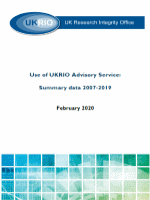Advisory service
UKRIO provides independent, expert and confidential advice on the conduct of academic, scientific and medical research, from promoting good practice to addressing poor practice and misconduct. Our Advisory Service covers all subject areas and any research practice with a connection to the UK. No other UK organisation has comparable expertise in providing such support, which draws on our Advisory Community.
Our Advisory Service is open to all, including the public, research participants, patients, individual researchers, research students and research organisations. We welcome enquiries on general or hypothetical topics, as well as specific research projects, issues and cases.
We advise on issues of good practice in research – how to get things right and what to do if you have problems with your research. We also advise whistle-blowers and others with concerns about research, and help those responsible to effectively deal with poor practice and allegations of misconduct. Promoting and sustaining good research practice is worthwhile in its own right and reduces the risk of misconduct.
To seek our advice on good research practice or possible misconduct, please use this form, which has more information on our role and remit.
Good practice in research
UKRIO provides guidance on all issues of good practice in research, including:
- Help with specific research projects;
- Education and training in good research practice;
- Issues of good practice and ethics relating to specific types of research;
- Creating or revising institutional systems for research integrity, ethics and governance, including to ensure good practice in research and address misconduct;
- Practical help with promoting and sustaining an institutional culture of good research practice;
- Help implementing The Concordat to Support Research Integrity and other requirements for research;
- The authorship of research articles and guidance on other issues of publication ethics.
Fraud and misconduct in research
Misconduct in research takes many forms. It can be serious and threaten lives; it can appear trivial, but still greatly harm research. Contact us for expert advice if you have concerns about:
- Fabrication of research data, processes or results;
- Falsification: the manipulation of research data, processes or results; or the omission of critical data or results;
- Misrepresentation of research data or of a researcher’s interests or involvement with the research;
- Plagiarism: the unauthorised use of or representation of another person’s material as one’s own original work;
- Improper use or storage of human tissue, materials or personal data;
- Research that may be causing unreasonable risk or harm to humans, animals used in research or the environment;
- Disputes about, or misrepresentation of, authorship in academic publications.
Protocol for responding to requests for assistance
Members of the public, individual researchers and research organisations trust UKRIO to provide independent, confidential and expert support. All who work for us, both staff and volunteers, must follow the highest standards of integrity, objectivity, honesty and professionalism. We follow a standard protocol for responding to enquiries:
We draw on our Advisory Community when responding to enquiries about the conduct of research. Our volunteer Advisers agree to comply with a Code of Conduct.
Use of our Advisory Service: summary data
To show the nature and complexity of our work, UKRIO has published anonymised, high-level summary data on the use of our Advisory Service, 2007-2019.
We are a charity and not a regulator and nobody is obliged, legally or otherwise, to seek our advice. This data should not be seen as necessarily representative of research integrity in the UK or the UK research community.
However, we have extensive practical experience in advising on good research practice and helping to promote research integrity. More than a decade of advisory work on research misconduct has given us a unique perspective on addressing fraud.
We present this data as an insight into the challenges and problems faced by UK researchers and research organisations. Our aim is to encourage researchers, institutions and related bodies to think more deeply, across all disciplines, about wider organisational and ethical issues affecting research practice.

Download: Use of UKRIO Advisory Service: Summary data 2007-2019
Please note: UKRIO gives advice on how to achieve and promote good research practice, how to address problems and mistakes, and how to respond to allegations of misconduct. The summary data in this report covers all of those types of requests for assistance; the data does not apply solely to allegations or investigations of research misconduct and should not be read as such.
